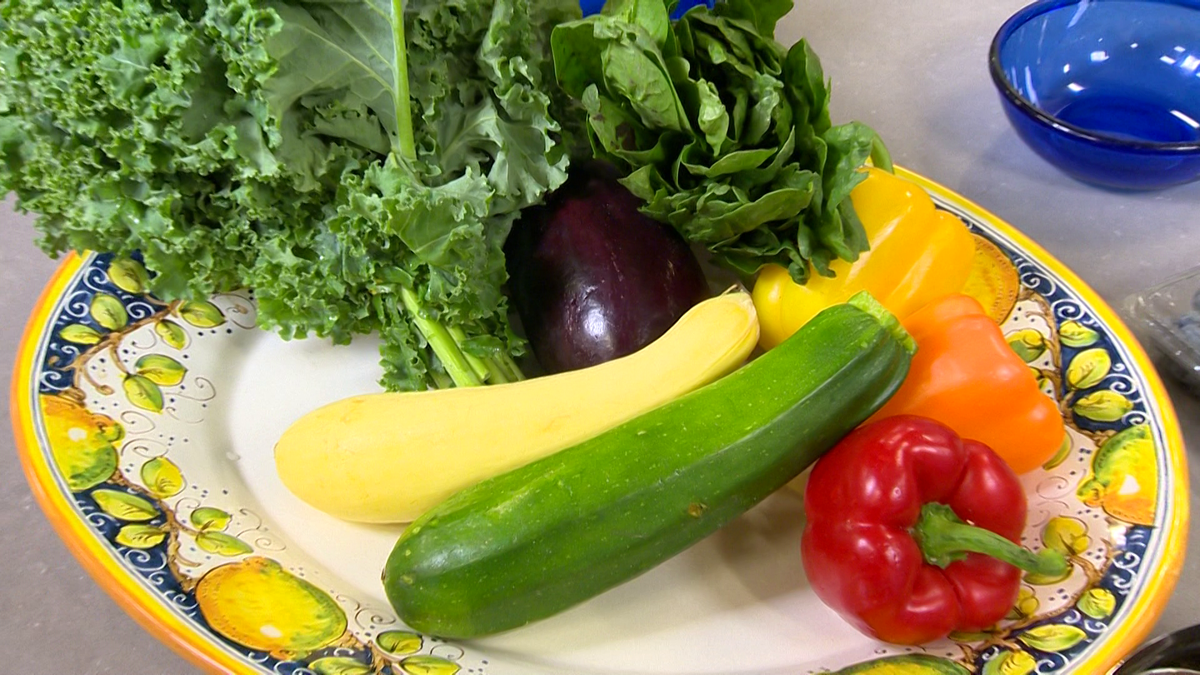Research indicates that adding certain ingredients to your eating plan can relieve anxiety and even combat depression. In a demonstration kitchen at the Mass General Hospital Health Care Center in Revere, Dr. Uma Naidoo said she had all the foods she needed to feel better. I’m so glad we have kale and lettuces here,” she said, picking up a bunch of spinach. “I love steaming it. I love sautéing it with a little garlic.” A graduate of Harvard, a clinic at Mass General Hospital, and an award winner from culinary schools, Naidoo literally wrote the book on nutritional psychology. talking about the food we we eat and that goes into our intestines,” she said. “But we need to step back for a second and realize that the gut and the brain are connected.” Naidoo points to the vagus nerve which connects our brain to other parts of the body, including our digestive system. Some experts call it the gut-brain axis, but this process begins in the stomach. “Foods, like all the antioxidant and anti-inflammatory polyphenols in these rich leafy greens, interact with the billions of microbes that reside there.” she says. “And these microbes are there to do us good.” So in the same way you might swallow a pill to treat a headache, Naidoo said you can treat other conditions by eating certain foods, like plain yogurt with a little spice. “Cinnamon is a great sweetener,” she said. “It helps stabilize your blood sugar. It’s a great antioxidant, so it’s a really good choice for breakfast or even a snack.” Other items on her list for reducing anxiety include dark green vegetables, like spinach, which contain folate, which boosts serotonin and other chemicals that regulate our emotions. Naidoo also recommends canned salmon, lentils and seeds containing omega 3 fatty acids. Studies have shown that they are essential for maintaining brain function and reducing inflammation. “I actually even use flaxseeds, as well as nuts and seeds on my salad for a little crunch,” she said. Naidoo said you may not notice a difference right away, but over time you will. “I’ve had patients contact me after a week saying, ‘I notice I’m sleeping better, I’m noticing a change,'” she said. “Also, sometimes if we have more inflammation in the gut it can take longer, but the issue is consistency and just adding those foods in while you slowly reduce the less healthy foods .”
Research indicates that adding certain ingredients to your eating plan can relieve anxiety and even combat depression.
In a demonstration kitchen at the Mass General Hospital Health Care Center in Revere, Dr. Uma Naidoo said she had all the foods she needed to feel better.
“I’m so happy we have kale and lettuces here,” she said, picking up a bunch of spinach. “I love steaming it. I love sautéing it with a little garlic.”
A graduate of Harvard, a clinic at Mass General Hospital, and awards from culinary schools, Naidoo literally wrote the book on nutritional psychology.
“We talk about the food we eat that goes into our intestines,” she said. “But we need to step back for a second and realize that the gut and the brain are connected.”
Naidoo refers to the vagus nerve which connects our brain to other parts of the body, including our digestive system. Some experts call it the gut-brain axis, but this process begins in the stomach.
“Foods, like all the antioxidant and anti-inflammatory polyphenols in these rich leafy greens, interact with the billions of microbes that reside there,” she said. “And these microbes are there to do us good.”
So in the same way you can swallow a pill to treat a headache, Naidoo said you can treat other conditions by eating certain foods, like plain yogurt with a little spice.
“Cinnamon is a great sweetener,” she said. “It helps stabilize your blood sugar. It’s a great antioxidant, so it’s a really good choice for breakfast or even a snack.”
Other items on her list for reducing anxiety include dark green vegetables, like spinach, which contain folate, which boosts serotonin and other chemicals that regulate our emotions.
Naidoo also recommends canned salmon, lentils and seeds containing omega 3 fatty acids. Studies have shown that they are essential for maintaining brain function and reducing inflammation.
“In fact, I even use flaxseed, as well as nuts and seeds on my salad to add a little crunch,” she said.
Naidoo said you may not notice a difference right away, but over time you will.
“I’ve had patients contact me after a week saying, ‘I notice I’m sleeping better, I’m noticing a change,'” she said. “Also, sometimes if we have more inflammation in the gut it can take longer, but the issue is consistency and just adding those foods in while you slowly reduce the less healthy foods .”
#Foods #Relieve #Anxiety #Fight #Depression
Image Source : www.wcvb.com

